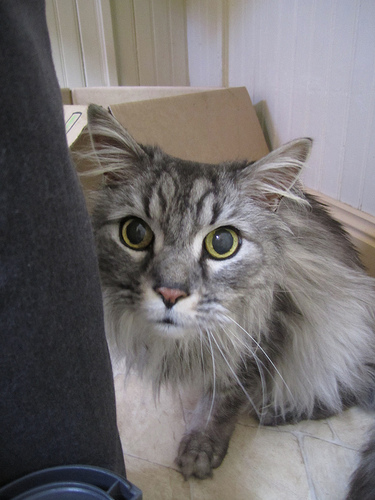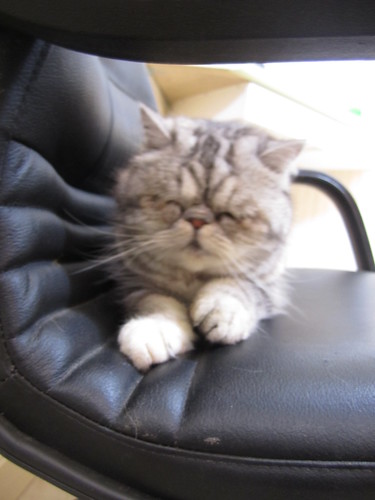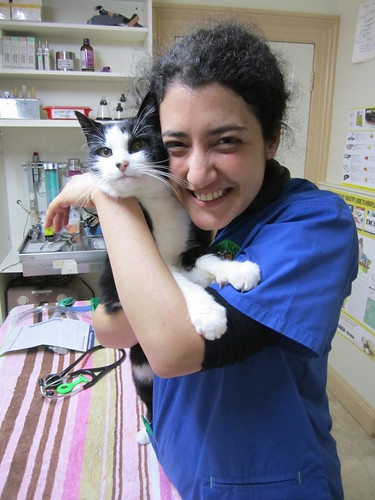Thirsty Kitty Cat
| Tweet |
This week I have been blessed with what I call a good cat run. I have had heaps of my geriatric cats come in for checkups or follow-up examinations. While I am usually psyched about seeing my feline friends, they do not share the same sentiment.
They arrive feeling flustered, humiliated and worst of all mortified at being in my consultation room.
I had two main coons today that live in the same household that were brought in at separate times. They both hid under the lid of their dismantled cat cage and it was very interesting they reacted the same exact way in the consultation room. In general, my cat patients either assume the paralyzed posture hoping I don’t see them and are simply too scared to move a muscle OR they run around rampant in the consultation room trying to discover a good hideout or escape route. On a few occasions, I have had the odd cat that went nuts and climbed up the walls of the consultation room. My advise is to leave them alone and to avoid grabbing/catching them during their melt down. Give them a few minutes to settle and then approach them swiftly and gently to prevent any escalations!
Greeby, my poor main coon from this morning would not settle down. He is a mommy’s boy and too frightened in the consulting room.
Isn’t he handsome? How I wish he would relax and allow me to get a fantastic photo of him to share…

I have tried all tricks in the book to help calm my feline patients down in my consultation room. I simply never pounce on my cat patients as soon as they arrive into my consultation room for an examination. I either open their cage and let them come out on their own accord or dismantle their carry cage and gently carry them out or even examine them in there. I have tried a multitude of cat treats that they mostly reject. I have also utilised feliway spray, a pheromone that is meant to help cats chill out.
Until now, I have yet to discover a bullet proof strategy to allow them to establish a good association with the vet clinic.
How I wish I could get a cat running excitedly into my consultation room like some of my canine friends! On the bright side, I speak the cat language and we gel quite nicely when it comes down to it and and my feline friends realise that I am not out their to kill them…
Below is Magdalena who made my day today… It felt like she knew I played a role in helping mend her skin allergies. We discovered she had a food allergy and she is doing great now and was actually happy to see me today & took over the chair in the consulting room. Don’t you just want to squeeze her?
Now as we are on the topics of felines, I thought I would seize the opportunity to discuss two very common diseases geriatric cats tend to develop. A geriatric cat is one that is greater than 8 years of age.
The first disease is chronic kidney failure.
A cat would have to lose 90% of its nephrons before it presents with kidney failure. The subtle sign you will observe in your cat is that he/she is drinking more than usual. I mean you do not often catch your cat in the process of drinking or eating so if you happen to notice him/her drinking more and more, then he/she may indeed be drinking a lot. They also can develop a dry coat and it can start to have that under-groomed patchy look. While the symptoms are quite classical, I would never say a cat has kidney failure based solely based on my examination or palpation skills. I have felt many tiny shrivelled up kidneys but without blood testing, you can never make a diagnosis of kidney failure.
I recall once thinking my patient had 90% chance of kidney failure and I was wrong but glad that I had emphasized the importance of blood work as it helped rule out the diagnosis. It is also important to do a urine test to stage the level of kidney disease. The more protein there is in the urine, the more advanced the kidney damage may be. Anyhow, I do not want to bore you with the medical workup.
The crucial point I would like to impart to you is that you should always get your cat blood tested if it is 8 years or older.
I mean when we are in our 40s or 50s, our GP would be recommending annual blood tests so that same concept of wholesome health care extends to our furry friends. If the vet doesn’t suggest it to you, then you should simply request it. It can help you detect early kidney disease. Why is that important? Well there is no cure for kidney disease and it is an irreversible process and so you may slow down its progression if it is detected earlier on. How? herbal/alternative remedies are present and more importantly special diets that reduce the ratio of proteins in the diet to stop overloading the kidneys. You can either brew up a home made diet provided to you from you vet or buying ready-made prescription diets like Hill’s Feline k/d or Eukanuba multi-stage renal formula and etc. They also recommend adding vitamin B to your cat’s diet and there is a ready made paste (nutrigel) at vet clinics.
As for the second disease they commonly develop but it seems to be at a much older age say 12 years or older. It is known as feline hyperthyroidism (over-secreting thyroid gland).
You can definitely treat and manage a hyperthyroid cat. I personally feel it is cruel not to treat your cat if it is suffering from hyperthyroidism. Why? Because if you don’t, your cat will waste away right before your eyes and develop serious behavioural disorders. They start vocalizing for food round the clock and even though they eat more, they seem to lose so much weight and eventually they start to vomit and get really crook! Thankfully there are several treatments options available. The golden standard is to send them to a vet specialist for radioactive iodine therapy but that costs a fortune and there are risks involved but it is usually curative.
The radioactive iodine therapy destroys the overly active thyroid gland and so your cat may then become hypothyroid and may thus require long-term thyroid supplementation (not a very common side-effect). The more common and affordable treatment option is daily tableting (that can be a challenge in itself in a cat) and so they have also now created an ear ointment instead (more expensive compared to the tablets but practical). The catch 22 with treating your hyperthyroid cat is you may unmask an underlying kidney disease. Even though the blood tests may indicate your cat is hyperthyroid but his/her kidney function is okay, that may be incorrect.
You see, hyperthyroidism causes hypertension (high blood pressure) and that can mask an underlying kidney failure.
Once you treat the hyperthyroidism and the hypertension is reversed, your cat may suddenly present in late stage kidney failure. Again, personally I still feel it is essential to treat the hyperthyroidism and simply keep a close tab on any possible underlying kidney issues via regular blood testing. I currently have a few 20+ year-old kitty cats that are responding well to the treatment of their hyperthyroidism. They have put on weight and are simply enjoying life and allowing their owners to sleep again without incessantly begging for food.
Below is a very special patient of mine named Orion. He initially responded really well to the treatment of his hyperthyroidism. Unfortunately he then relapsed and started to lose weight again. I reassessed him this week and discovered he has since developed an abdominal tumour (unrelated to his hyperthyroidism) that is the true cause of his weight loss. He is still full of spice and so he went home on palliative care and to enjoy what time he is left being cherished by his family.
Related articles
Pets age just as we do (rayyathevet.com)
Filed under: Favourite Articles, Medicine Cases Tagged: alternative remedies, behavioural disorders, blood testing, cat check, cat patients, climbed up the walls, common diseases, consultation room, daily tablet, detect early kidney disease, diagnosis, drinking a lot, drinking more than usual, ear ointment, escape route, Eukanuba, feliway, feliway spray, geriatric cats, herbal, Hill’s Feline k/d, hyperthyroidism, Kidney, kidney failure, main coons, Multi-Cat Homes, nephrons, nutrigel, Palliative care, patchy look, protein, radioactive iodine therapy, shrivelled up kidneys, skin allergies, special diets, subtle signs, Thyroid, urine test, vet exam, vet help, vet specialist, vitamin B, vomit Source: http://rayyathevet.com/2011/08/24/thirsty-kitty-cat/
| Tweet |



Facebook Comments